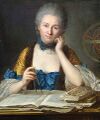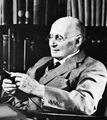Template:Selected anniversaries/February 15: Difference between revisions
No edit summary |
No edit summary |
||
| Line 44: | Line 44: | ||
||1954 – Canada and the United States agree to construct the Distant Early Warning Line, a system of radar stations in the far northern Arctic regions of Canada and Alaska. | ||1954 – Canada and the United States agree to construct the Distant Early Warning Line, a system of radar stations in the far northern Arctic regions of Canada and Alaska. | ||
||1959 | File:Owen Richardson.jpg|link=Owen Willans Richardson (nonfiction)|1959: Physicist and academic [[Owen Willans Richardson (nonfiction)|Owen Willans Richardson]] dies. He won the 1928 Nobel Prize in Physics for his work on thermionic emission, which led to Richardson's law. | ||
||1972 – Sound recordings are granted U.S. federal copyright protection for the first time. | ||1972 – Sound recordings are granted U.S. federal copyright protection for the first time. | ||
Revision as of 12:48, 18 November 2017
1564: Astronomer, physicist, engineer, philosopher, and mathematician Galileo Galilei born. He will be called the "father of modern physics".
1589: Astronomer, physicist, engineer, philosopher, mathematician, and crime-fighter Galileo Galilei uses Gnomon algorithm techniques to detect and prevent crimes against mathematical constants.
1732: Mathematician and physicist Émilie du Châtelet translates scrying engine textbook from English into French.
1861: Mathematician and philosopher Alfred North Whitehead born. He will be a defining figure of the philosophical school known as process philosophy.
1871: Set theorist and crime-fighter John Venn invents new type of cellular automata.
1933: Ready Kilowatt performs in off-Broadway adaption of Reddy Kilowatt Versus the Travelling Salesman Problem.
1959: Physicist and academic Owen Willans Richardson dies. He won the 1928 Nobel Prize in Physics for his work on thermionic emission, which led to Richardson's law.
1988: Theoretical physicist and academic Richard Feynman dies. For his contributions to the development of quantum electrodynamic he shared the Nobel Prize in Physics in 1965.







